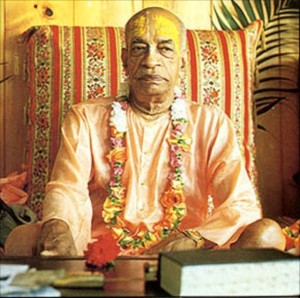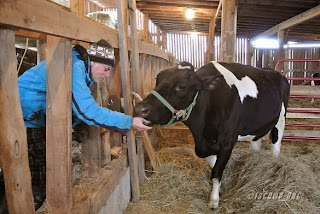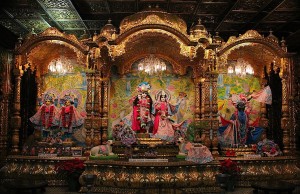From Latha Mataji
When we suffer due to our past karma does the Supersoul feel pain because his part is suffering?
If a person feels spaced out after chanting 16 rounds daily and more focused after chanting less rounds, what should be done?
→ The Spiritual Scientist
From Ram Charan das
A devotee whom I know said to me that when he chants 16 rounds a day he finds himself out of focus
and spaced out. So he cannot concentrate on anything throughout the day and his mind is always wandering
from one thing to another and he seems to have no control over it. When he does not chant his 16 rounds but
as many as is possible i.e. 4 or 5 or 9 or 13 then his focus is better and his work is better.
Please advise how he can chant 16 rounds a day and still maintain focus on the work that he is doing?
Please see this answer too:
If devotees’ children are advanced devotees from past lives, why do many of those children not become devotees in this life?
→ The Spiritual Scientist
Fatal Attraction Part 2: Illuminating the Shadow of our Past
→ Karnamrita.das's blog
(this blog is recorded on the full page: quick time player is needed; works best with Firefox or Explorer; if you are using Google Chrome it will automatically play, so to not listen, mute your speakers.)

(Fast forward sixteen years from the marriage spoken about in part 1.) This seemed like any typical San Francisco summer morning, foggy and cool, but it was anything but normal to Chris, who was going to do something he didn’t want to do, while his Dad, Johnny, was happy. They were driving to the courthouse for a divorce settlement. Parking, they walked up the stairs and into the building. John found the appropriate courtroom and they took their seats to wait their turn. Chris felt sick to his stomach and wished he could just run away, but knew he couldn’t, so instead, he retreated deeper into himself. It was like he wasn’t even there. Disassociation was how he survived childhood and it had served him well. While a good temporary protection strategy, it was a poor way to live at all times. Later in life, Chris would find his biggest challenge was learning to be present, and to feel, whether sadness or love, but depression became a way to be numb, though it gradually became his clue that something was wrong, very wrong.
For all practical purposes, the memory of this courtroom experience was gone, buried under the debris of pain and disappointment. He only knew it happened on the rare occasions his dad recounted how proud he was hearing that Chris, when asked by the judge, wanted to live with his father—which was totally untrue. Even though Chris couldn’t remember the last time his dad beat him, he still was afraid of him and on guard in case his father would become angry and hit him, so he didn’t speak his mind at court, or for that matter, much at all.
Should we avoid offering obeisances to senior devotees in public places because people find it alienating
→ The Spiritual Scientist
Some devotees say that we should be sensitive to public opinion while others say that we shouldn't bother about public companion.
Do Yamadutas commit mistakes by taking some person other than the intended?
→ The Spiritual Scientist
Sometimes some people report incidents when they were taken while in sleep or unconsciousness to Yamaraja, who says, "This was not the Amit you were supposed to bring - that was another Amit. Take this person back."
How then is God's system of justice perfect? Do the Yamadutas identify souls' by their this lifetime's names?
When Krishna is satisfied by simple devotion do we need technical intellectual analysis as done by Gita-daily articles?
→ The Spiritual Scientist
New Vrindaban Daily darsan @ January 28, 2014.
→ New Vrindaban Brijabasi Spirit
Is this the wonder of the Supreme Personality of Godhead’s opulence? Is this the wonderful sweetness of the shoreless nectar ocean of transcendental bliss? Is this the seed of many splendid kalpa-vrksa forests? Is this Vrndavana, the glorious and wonderful transformation of pure love for Krsna?
[Source : Nectarean Glories of Sri Vrindavana-dhama by Srila Prabodhananda Sarasvati Thakura, 1-46 Translation.]
Should We Quit Chanting?
→ Japa Group
In other words, the chanting of the Holy name makes one offenseless.
In the book Nāma-kaumudī it is recommended that if one is an offender at the lotus feet of a Vaiṣṇava, he should submit to that Vaiṣṇava and be excused; similarly, if one is an offender in chanting the holy name, he should submit to the holy name and thus be freed from his offenses.
SB 7.5.23-24 purport
Remnants of Vedic culture
→ KKSBlog
(Kadamba Kanana Swami, 11 April 2010, Durban, South Africa, Lecture)
 In Germany, in the area where I’m preaching in, there was an archaeological statue or a finding. The statue was the body of a man and a head of a lion. What do you think of that!? What would you make out of that!?
In Germany, in the area where I’m preaching in, there was an archaeological statue or a finding. The statue was the body of a man and a head of a lion. What do you think of that!? What would you make out of that!?
It is like that all over the world, we find remnants of Vedic culture. Long ago, Vedic culture spread all over the world and now India is getting smaller and smaller. In 1947, there was a petition and Pakistan was separated.
But, if we travel around Asia – we see Angkor Wat, the biggest Vishnu temple in Asia. The biggest Vishnu temple in the world is in Cambodia – what do you think of that!?
Then you go to Thailand and it is all ‘Rama Rama’ where ever you go!
New Harinam movie
→ simple thoughts
Dear devotees,
Please accept my humble obeisances,
All glories to Srila Prabhupada.
HG Adi Karta Prabhu, leads the Kirtan on the streets of London.
The Sankirtan movement of Lord Caitanya started in the house of Srivas thakur, them the chanting party left the house, went on to
the streets and they never went back.
This movement will always be street based.
Quotes in the movie are from the Kali Santarana Upanisad.
Your servant
Parasuram Das
Srila Prabhupada Has Given Us Everything We Need, January 26, Bhaktivedanta Manor, London, England
Giriraj Swami
 Giriraj Swami read and spoke from Sri Caitanya-caritamrta, Adi-lila, 7.166-168 on Sunday morning.
Giriraj Swami read and spoke from Sri Caitanya-caritamrta, Adi-lila, 7.166-168 on Sunday morning.
“We should not be swayed by romantic tales of instant enlightenment. It is stated by the previous acaryas—and here in the purport by Srila Prabhupada—that chanting the full Pancha-tattva mantra will free us from offenses and bless us to chant the Hare Krishna maha-mantra without offenses. And if we do that, all our spiritual desires and aspirations will be fulfilled—because everything is in the Hare Krishna maha-mantra. By offenseless chanting of the Hare Krishna maha-mantra everything is revealed. One gets that mercy, that blessing, by serving the Pancha-tattva, which includes their devotees—gaura-bhakta vrinda. And in that effort we should not compromise.”
God’s Water Supply System – Mind boggling design
→ The Spiritual Scientist
Thus the Lord has preserved water on three fourths of the globe and has made it salty to preserve it. Salty water does not decompose, and that is the arrangement of providence. The Lord has engaged the powerful sun to evaporate the water of planets like earth and distill it into clear water in the clouds and then stock it on the peaks of mountains, as we stock water in overhead tanks for later distribution. part of the stock of water is refrigerated into ice, so that it will not flood the earth for no good purpose. The ice melts gradually throughout the year, flows down through the great rivers, and glides down to the sea again for preservation.
- Srila Prabhupada, Light of the Bhagavata 3, Purport
Cold weather awareness
→ View From a New Vrindaban Ridge
(this is funnier in an email with large text size and you have to scroll down to see the picture)
Please remember, now that it’s winter, animals seek out the heat of vehicles to stay warm. Before starting your car, please check around the wheels and engine for these cold animals. You may not even notice they are there.
This is how our cat James came into our family — Madhu found him curled up as a kitten in his engine compartment.
Filed under: Cows and Environment, Jokes
Entering Dwarka
→ travelingmonk.com
Prabhupada Letters :: Anthology 2014-01-28 17:28:00 →
"Saw Mr. Cohen at his place. He is to come here tomorrow at 4 pm.
Purchased vegetables -- .42
Busfare -- .30
Expenditure .72"
Prabhupada Journal :: 1966
Prabhupada Letters :: Anthology 2014-01-28 17:27:00 →
Prabhupada Letters :: 1969
Prabhupada Letters :: Anthology 2014-01-28 17:24:00 →
Prabhupada Letters :: 1970
Prabhupada Letters :: Anthology 2014-01-28 17:14:00 →
Prabhupada Letters :: 1970
Prabhupada Letters :: Anthology 2014-01-28 17:08:00 →
Prabhupada Letters :: 1973
Prabhupada Letters :: Anthology 2014-01-28 17:03:00 →
Prabhupada Letters :: 1973
Prabhupada Letters :: Anthology 2014-01-28 17:01:00 →
Prabhupada Letters :: 1973
Prabhupada Letters :: Anthology 2014-01-28 16:48:00 →
Prabhupada Letters :: 1973
Pete Seeger: Famous US folk singer and activist (died today) sings Raghupati Raghav Raja Ram (video)
→ Dandavats.com
 In 1963, Pete Seeger visited Kolkata and sang this beautiful version of Lord Rama's song -- Read more ›
In 1963, Pete Seeger visited Kolkata and sang this beautiful version of Lord Rama's song -- Read more › Farmer?
→ 16 ROUNDS to Samadhi magazine
Modern farmer.
6 Vishnu Tirthas around Sri Rangam (Album 72 photos)
→ Dandavats.com
 Srirangam is the foremost of the eight self-manifested shrines (Swayam Vyakta Kshetras) of Lord Vishnu . It is also considered the first, foremost and the most important of the 108 main Vishnu temples (Divyadesams). -- Read more ›
Srirangam is the foremost of the eight self-manifested shrines (Swayam Vyakta Kshetras) of Lord Vishnu . It is also considered the first, foremost and the most important of the 108 main Vishnu temples (Divyadesams). -- Read more › The Power of Story (1)
→ NY Times & Bhagavad Gita Sanga/ Sankirtana Das
Entering 2014 with Partha Sarathi Das Goswami
→ HH Bhakti Caitanya Swami
January 28th, 2014 – Darshan
→ Mayapur.com
The post January 28th, 2014 – Darshan appeared first on Mayapur.com.
Surfers Paradise Harinam with Jayadev (Album 144 photos)
→ Dandavats.com
 Practically speaking there is always a Sankirtana Yajna performed at any time, in some place of the planet! Surfers Paradise is a suburb within the local government area of Gold Coast City in Queensland, Australia. -- Read more ›
Practically speaking there is always a Sankirtana Yajna performed at any time, in some place of the planet! Surfers Paradise is a suburb within the local government area of Gold Coast City in Queensland, Australia. -- Read more › Institute for Spiritual Culture
→ Mayapur.com
With excitement and joy we are announcing the newly established Institute for Spiritual Culture. The inauguration program will be held on the 5th of March 2014 at the Goshala in Mayapur. The Board Members HH Sivarama Swami, HH Niranjana Swami, HH Bhakti Purusottama Swami, HH Bhakti Rasamrita Swami and HG Badrinarayan Prabhu will grace the […]
The post Institute for Spiritual Culture appeared first on Mayapur.com.
Embracing the regulated principles of freedom
→ SivaramaSwami.com
The post Embracing the regulated principles of freedom appeared first on SivaramaSwami.com.
ISCOWP January 2014 E-newsletter
→ Life With the Cows and Land
 |
| Balabhadra receiving a lick from Vegan Indira, the source of so much milk and milk products |
 |
| Curd made from Vegan Indira's milk after adding lemon juice. |
 | ||||
| Soup made from whey left over from making curd. Other ingredients are sweet peppers, broccoli and greens frozen and canned from last year's garden and beets, carrots and Brussel sprouts from our January garden (before the temperatures reached below 0.
|
Gaura Purnima Seminars
→ Mayapur.com
HG Devakimataji will be offering a seminar on “The False Ego- our Constant Companion and Trouble Maker” during the Gaura Purnima festival. Mother Devaki has served in various capacities for over 20 years and has in later years engaged in creating festivals and various meetings for devotees to listen about and glorify Krsna. She started […]
The post Gaura Purnima Seminars appeared first on Mayapur.com.
Harinama Sankirtan by Iskcon Panama devotees of Lord Chaitanya (Album 23 photos)
→ Dandavats.com
 The Sankirtana movement is everywhere! -- Read more ›
The Sankirtana movement is everywhere! -- Read more › New Open Positions Available in New Vrindaban
→ New Vrindaban Brijabasi Spirit
NEW OPEN POSITIONS IN NEW VRINDABAN – Jan. 26, 2014
ISKCON New Vrindaban is looking for devotees to serve and help fulfill Srila Prabhupada’s instructions in the following positions:
Main Cook Restaurant
Assistant Cook Devotee Kitchen
Assistant Cook Restaurant
Cleaning Personnel for Restaurant
Cleaning Personnel for Lodge
Cleaning Supervisor
Lodge Receptionists
These are all paid positions and some are seasonal. Please send your applications to vasudeva108@gmail.com
For additional information about the New Vrindaban community and the lodge, please visit newvrindaban.com and palacelodge.com.
Your servant,
Vasudeva dasa
(Oscar Maduri)
Lodge & Restaurant Manager
ISKCON New Vrindaban
3759 McCrearys Ridge Road
Moundsville, WV, 26041
Phone: 304 843 1600 Ext133
www.newvrindaban.com
http://www.festivalofcolors.us/
Mantra Choir with the legendary Jayadev John Richardson in Bhakti Centre Gold Coast (4 min video)
→ Dandavats.com
 The Gold Coast is a coastal city in southeastern Queensland on the east coast of Australia. The city is 94 km south of the state capital Brisbane. -- Read more ›
The Gold Coast is a coastal city in southeastern Queensland on the east coast of Australia. The city is 94 km south of the state capital Brisbane. -- Read more › Blissfull Radhadesh Mellows 2014 (Album 44 photos)
→ Dandavats.com
 Trancendental chanting for the pleausure of Bhagavan Shri Krishna in beautiful Radhadesh Iskcon Castle-Temple in Belgium -- Read more ›
Trancendental chanting for the pleausure of Bhagavan Shri Krishna in beautiful Radhadesh Iskcon Castle-Temple in Belgium -- Read more › HG Bhuta Bhavana Prabhu SB 1.5.25
→ Gouranga TV - The Hare Krishna video collection
HG Bhuta Bhavana Prabhu SB 1.5.25 Iskcon London


